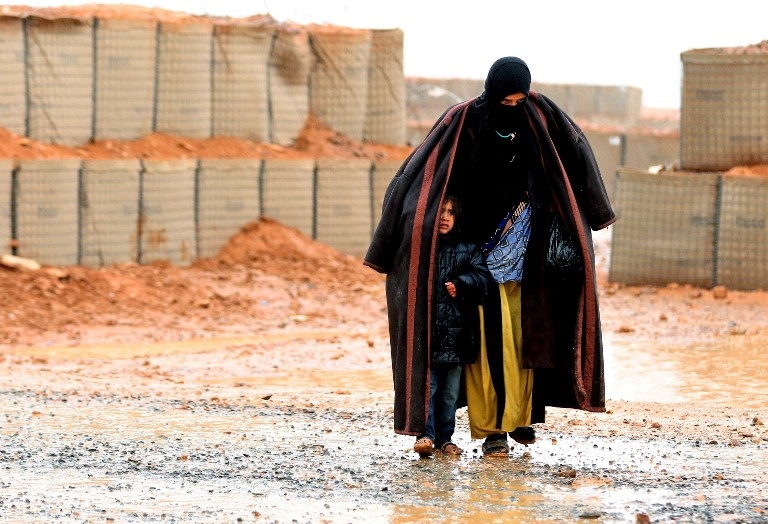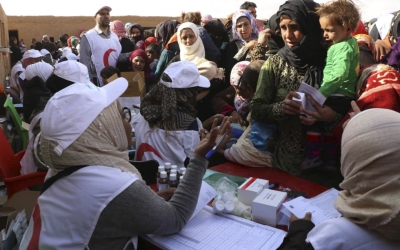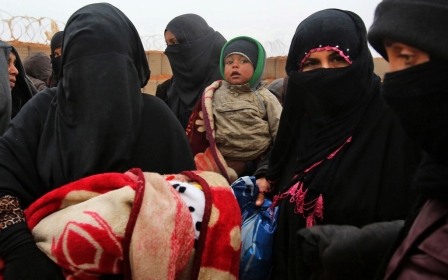Syria: Desperately needed aid reaches remote Rukban camp

A US-based NGO has managed to deliver desperately needed aid to displaced Syrians in the remote Rukban camp near Syria's border with Jordan, in breakthrough humanitarian efforts.
The Syrian Emergency Task Force (SETF) said on Tuesday that it had successfully delivered its first aid shipment to the 8,000 internally displaced men, women and children - who Syrian President Bashar al-Assad has denounced as "terrorists" - living in the camp.
"The US had advocated for aid to the camp but has relied on processes that seem to be under the control of Assad and Russia - the same people who engage in the siege," Mouaz Moustafa, executive director of the SETF, told MEE.
Aid deliveries to the camp, which is located deep in the desert, are rare. The last UN-backed aid delivery was in September 2019.
Stay informed with MEE's newsletters
Sign up to get the latest alerts, insights and analysis, starting with Turkey Unpacked
"It is a camp that lacks any education or medical infrastructure," Moustafa said.
The camp is situated within a 55km "deconfliction zone" surrounding the US-occupied military base in al-Tanf. SETF used US military aircraft to funnel aid in from the garrison.
SETF said the initial delivery included seeds and irrigation tools to enable the residents to cultivate their own sustenance, as well as much-needed school supplies.
Additional deliveries of baby formula, prenatal vitamins, school books and food items are being prepared for further shipments scheduled to arrive over the next few weeks.
SETF's executive director added that they want to see a "complete revolution" in the education system there, through providing books and access to teachers as well as making sure they can farm and become "self-sustaining".
"With a lot of aid coming in and knowing that this is an ongoing process, the reception has been very positive and the people in the camp feel hopeful," Moustafa said.
'Breaking the siege means survival. It means there is hope for life in this place in the middle of the desert and the midst of the imposed siege'
- Rukban school principal
The shipment represents a breath of fresh air for Rukban after a years-long siege by Assad's forces.
"Breaking the siege means survival. It means there is hope for life in this place in the middle of the desert and the midst of the imposed siege," said Rukban's school principal.
After Jordan closed its border in 2016, the camp was forced to rely on UN agencies based in Damascus for aid. But due to the stronghold that Syria and its Russian allies exert over the camp, very little has been able to get through.
Despite Rukban's proximity to al-Tanf, the US has let the camp rely on the UN to organise humanitarian aid into the camp.
Dire conditions
The siege has left those in Rukban living in dire conditions. With little to no aid coming in, residents lack access to food staples, as well as basic medical supplies and health infrastructure.
They are forced to live in makeshift dwellings without running water or basic sanitation. And their school system is all but non-existent.
For years, children in the camp have had to make do with only three school books. It is hoped that this will change with the second SETF aid shipment, which will contain 12,000 school books.
This US government helped with providing transport for the delivery of aid, according to SETF.
"An American organisation supported by American donations was able to find a legal process to utilise available space on ongoing operations," Moustafa said.
The camp was established in 2014, three years into Syria's ongoing civil war, when thousands fled southern Syria as Assad's government waged war on rebel groups.
At its height, the camp had over 60,000 inhabitants. But faced with such poor conditions, many left over time, returning to territory controlled by the Syrian government or to other parts of the country with the aid of smugglers.
However, for many, including those still in Rukban, returning to government-held areas is not an option. Amnesty International reported that many of those leaving have been subject to arrest, torture and forced disappearance.
Abu Mohammad, SETF's Rukban field director, said: "There is no place for us to go except to be returned to regime-held areas where the regime will kill us."
In November, SETF documented the deaths of two men who were killed under torture after they were arrested when leaving the camp.
While the aid delivery might give residents in Rukban cause to celebrate in the short term, many still fear for their future.
The Syrian government recently normalised relations with most Arab countries, leaving the camp's status less certain.
Middle East Eye delivers independent and unrivalled coverage and analysis of the Middle East, North Africa and beyond. To learn more about republishing this content and the associated fees, please fill out this form. More about MEE can be found here.





